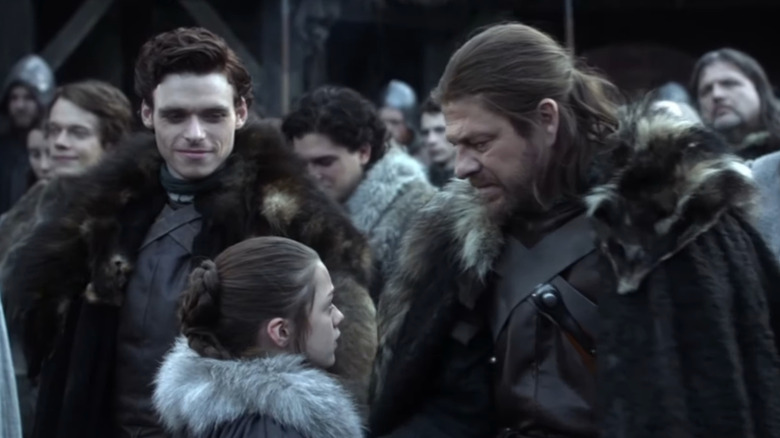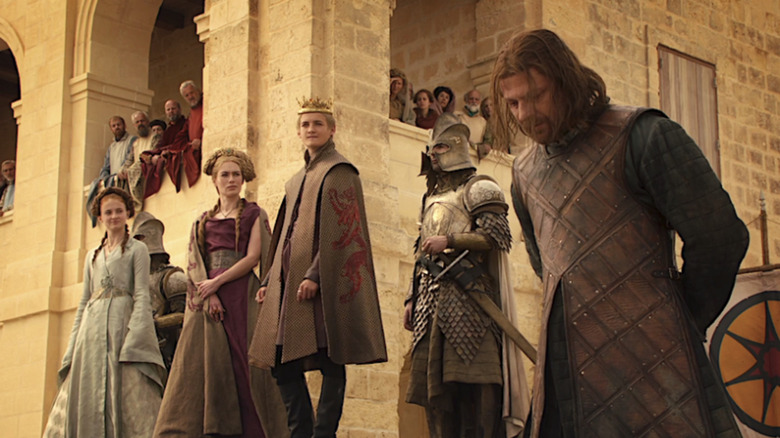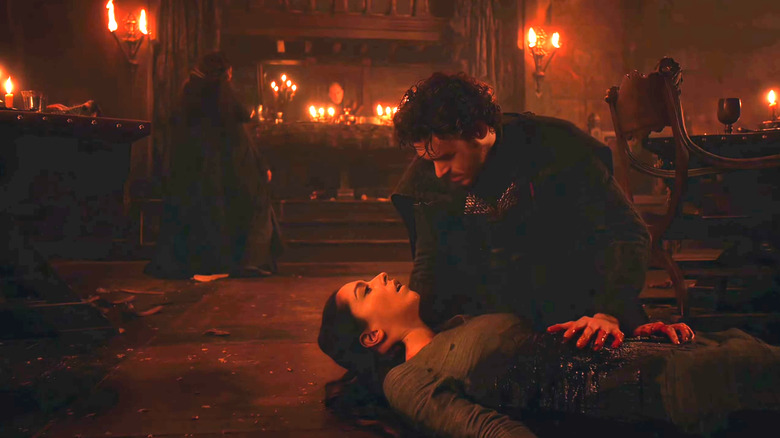Why Game Of Thrones Kills Off Both Ned And Robb Stark
TV viewers didn't know "Game of Thrones" was a truly hardcore show until the penultimate episode of season 1, "Baelor," which killed off the supposed lead of the series Ned Stark (Sean Bean). It was a moment that radically redefined what sort of series this was, declaring to viewers that this was a story where mistakes mattered, where plot armor didn't exist, where there was no guarantee your favorite character would make it to the end of each episode, let alone season.
Despite this, TV-only fans still managed to get their hopes up for Robb Stark, the King of the North who rebelled against the Lannisters to avenge Ned's death. Even though his rebellion slowly fell apart over the course of seasons 2 and 3, and even though he made a horrendous tactical mistake by marring Talisa (Oona Chaplin) instead of one of Walder Frey's daughters as promised, fans still held on hope that he could pull out a win. But in June 2013 "The Rains of Castamere" aired, and Robb, Catelyn, Talisa, and even poor Grey Wind were murdered in a single swoop.
In a 2019 oral history from Entertainment Weekly of that famous season 3 episode, George R. R. Martin explained himself:
"I like my fiction to be unpredictable... I knew [I'd kill off Robb Stark] almost from the beginning [of writing the first book]. I killed Ned because everybody thinks, 'He's the hero [and], sure, he's going to get into trouble, but then he'll somehow get out of it.' The next predictable thing is to think his eldest son is going to rise up and avenge his father. Everybody is going to expect that. So immediately [killing Robb] became the next thing I had to do."
Despite how it may sound, Martin wasn't just interested in murder for shock value
Martin continued, "It was the hardest scene I've ever had to write. It's two-thirds of the way through the book, but I skipped over it when I came to it. So the entire book was done and there was still that one chapter left. Then I wrote it. It was like murdering two of your children."
Martin's explanation for killing Robb, with its focus on unpredictability, has often gotten him accused of being a writer only interested in nihilism and shock value. When you read negative reviews of the books and show, a common complaint you'll see is that he's being lazy and meanspirited, prioritizing cool "unpredictable" twists instead of thoughtful writing and meaningful character arcs.
However, fans who continue reading past the Red Wedding will likely realize that Martin does indeed have a lot of respect for traditional storytelling, and he's not really a nihilist at all. Most of his main characters in the books, especially the younger Stark siblings, grow as people, learn from their hardships, and have trajectory to rise up and save Westeros from a zombie invasion. Ned, Rob and Catelyn's deaths are not mindless shock value; they're a core part of the other Starks' traditional hero's journeys.
Likewise we can see constant examples of Martin making clear that kindness is indeed a virtue worth keeping. Ned's honor leads to him still having loyal supporters even four books after his death, just as the Lannisters' dishonor has led to their house crumbling piece by piece. We can also see through Jon and Daenerys' leadership roles in "A Dance with Dragon" that Martin has a lot of respect towards leaders trying to be fair and honorable; he just recognizes that being a kind leader is easier said than done.
Ned, Robb, and Catelyn's deaths weren't as subversive as they seem
In the end, the biggest trick "Game of Thrones" ever pulled was not killing off Ned or Rob Stark — it was tricking the audience into thinking these were core characters in the first place. Just because Ned got the most screentime in the first season didn't mean he was the main character, for instance; the true main characters were always Jon Snow and Daenerys Targaryen, with Tyrion right behind them. Ned only seemed like the main character because the series hadn't yet revealed its full scope.
With Cat and Robb, the misunderstanding around their importance was largely the readers and viewers' fault. The text kept reminding us that the War of the Five Kings was a distraction from Westeros' real threats: the impending invasion from the east with Daenerys and the invasion from the north with the White Walkers. Robb and Catelyn were always expendable; we just tricked ourselves into thinking otherwise because we wanted so badly for Ned to be avenged.
Although denying us the satisfaction of seeing Robb take down the Lannisters might seem cruel, the alternative Martin's offering might actually be more optimistic than the expected route. The Lannisters may have won their war against the Starks, but their cruelty and arrogance still come back to haunt them nonetheless. By the end of "A Dance with Dragons," Joffrey, Tywin, and Kevan have all died, Cersei and Jaime are on the outs, and Tyrion has defected from the house entirely. And if the show is any indication of what the future books have in store, things will only get worse for them from there. Martin may often deny his readers the catharsis of traditional justice, but his villains almost always get what they deserve in the end.


